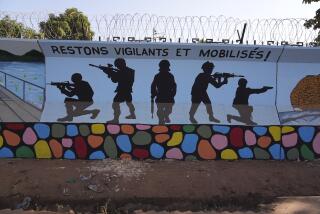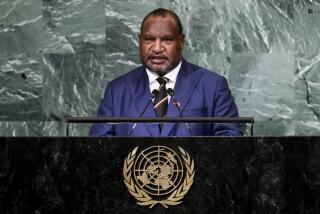Ethnic violence leaves at least 39 dead in Kenya
JOHANNESBURG, South Africa — Attackers swept into a village in southeastern Kenya involved in longstanding ethnic disputes and killed at least 30 residents early Friday, police and the Kenyan Red Cross told local media. Nine of the assailants also died in the violence.
The assault on the village of Kipao reflected long-held tensions over land and access to river water between rival communities of Pokomo farmers and Orma cattle herders in the region. Friday’s attack was carried out by about 150 Pokomo, Kenyan police spokesman Anthony Kamitu told journalists.
Police imposed an overnight curfew in the area to prevent more violence.
Earlier clashes in August and September in the volatile Tana River coastal region killed more than 100 people. A judicial commission of inquiry led by Judge Grace Nzioka is investigating the cause of the violence.
Tensions had been building anew in recent days, police told reporters. Friday’s raiders, armed with spears and AK-47s, reportedly burned down dozens of huts and hacked people to death. Thirteen children and six women were among the dead.
Kenyan President Mwai Kibaki said the assailants would be caught and prosecuted. “No effort will be spared in ensuring perpetrators of the heinous act are brought to book,” he said.
The violence was believed to also have political undertones in the lead-up to elections in March, raising fears that the vote could spark the kind of ethnic violence that marred balloting in 2007, when riots left about 1,500 people dead.
Although on the surface the ongoing violence appears related to competition over resources, an underlying trigger could be the redrawing of electoral boundaries in the area, which caused a shift in the relative power of different communities, the United Nations’ humanitarian coordinator in Kenya said in August.
After the clashes this fall, local lawmaker Dhadho Godhana was accused of stoking the tension. He was removed from office and charged with inciting violence. He denies the charges.
Politicians were also accused of promoting the 2007 mayhem. Four prominent Kenyans have been charged by the International Criminal Court with inciting the violence, including Deputy Prime Minister Uhuru Kenyatta and lawmaker William Ruto.
The latest round of violence began in August, with accusations and counter-accusations between the communities over cattle grazing on farmland leading to a cycle of revenge attacks. Government troops were stationed in the area, but attempts to prevent a repeat of the violence failed.
Judge Nzioka, whose commission has interviewed 95 witnesses, told Kenya’s Daily Nation newspaper that Friday’s attack came as a surprise.
“We thought progress has being made but now we may have to review the position,” she said.
ALSO:
Islamists, opponents clash in Alexandria, Egypt
Suspicions swirl over disappearance of activist in Laos
U.N. Security Council approves one-year military mission in Mali
More to Read
Start your day right
Sign up for Essential California for news, features and recommendations from the L.A. Times and beyond in your inbox six days a week.
You may occasionally receive promotional content from the Los Angeles Times.






